Food Processing Enterprises
Organic Spices unit
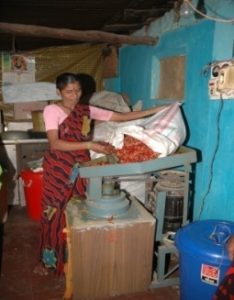
Rosella Product Unit
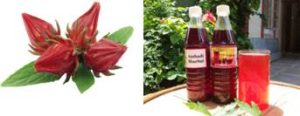
As the demand for the fresh drink made from Rosella increased, for the first time in the Wardha district Rosella Product unit was set up. The Rosella unit utilizes Rosella for making beverages, pickles, bar and jam on commercial scale. The Rosella products are rich in micronutrients, anti-oxidants, and have medicinal properties.
Pickle & Jam Unit
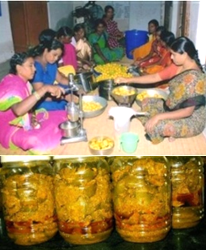
Dring peak season, the perishable fruits and vegetables are sold by farmers at throwaway prices and due to a lack of appropriate storage facilities, a large amount gets wasted. These Pickle and Jam units help local farmers to get better prices for seasonal fruits and vegetables. These units process locally grown perishable fruits and vegetables like Mango, Guava, Banana, Papaya, Lemon, Tomato, Brinjal, Bitter gourd, Chilly, Suran, etc. and makes value-added products like pickles and jams.
Indigenous Food Products
Traditionally, during the summer months, rural women prepared many indigenous healthy preparations that lasted the whole year. As the process of making these preparations is tedious and time-consuming, therefore,this practice started fading gradually. MSS set up enterprises to revive the traditional preparations of healthy food products. Presently, four indigenous food product units prepare indigenous verities of papad, nuggets, chutney, noodles, dried vegetables, flours etc. The raw materials for these units are procured from 20 surrounding villages.
Solar Drierd Food Products
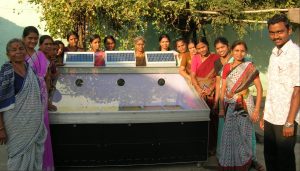
Rural Bakery
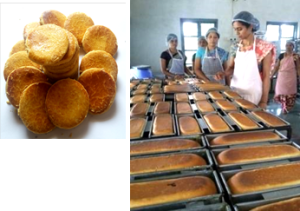
Organic Gud Unit
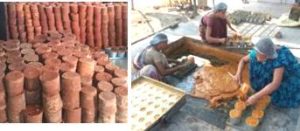
Edible Oil Unit
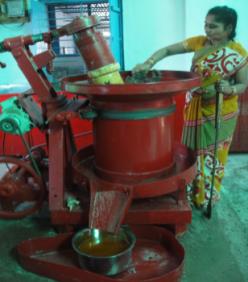
A decade back 80% of rural households of the Vidarbha region that consumed Flax Seed oil have shifted to soybean oil. To counter this, MSS is leading the ‘Tel Swaraj’ movement. The movement is to bring awareness in consumers regarding the hazards of unhealthy imported oils and requesting them to revert back to healthy, fresh, locally made Flaxseed and Groundnut oils.
MSS is also organizing a signature campaign to protest against the Government’s policy of closing down decentralized Gandhi’s Ghani (Wooden oil expeller).
MSS has set up three cold press oil units in Kopra, Girad and Wardha villages (Maharashtra). Apart from fresh, healthy and nutritious Flax Seed, Groundnut, Sesame, Mustard, and Coconut oils, these units sell good quality oil cakes, containing 20 to 30 % oil as cattle feed to farmers. These units also serve as service centres where, at a very nominal rate, the farmers can process their oil seeds.
MSS is leading a campaign in Samudrapur block to revive the cultivation of Flaxseed. The campaign has led to an increase in the number of farmers growing Flaxseed from 5 to 100.
Cow Dung Based Enterprises
_________________________________________________________
Manure Unit
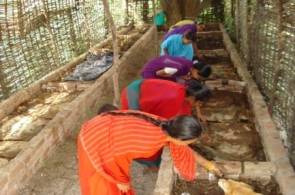
Commercial crops like Sugarcane, Banana, Orange, Cotton, and Pulses dominate the local agrarian economy. With decreasing productivity of soil, the commercial farmers have started demanding cow dung based manure and organic compost. Units in Seloo and Samurapur block are producing manure on a commercial scale.
Herbal Pesticide Unit
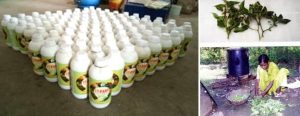
In this region, the dominant commercial crops are Cotton and Soya Bean. To protect these crops, farmers use high doses of costly chemical pesticides and weedicides. It is estimated that out of the total chemical pesticides used in farming, 60% is used only for the cotton crop. In Samudrapur block, a commercial herbal pesticide unit is established that provides subsidiary income to ten rural youth. The herbal pesticides are prepared from the locally available weeds, seeds, leaves, and spices. These herbal pesticides (with the same efficacy as chemical pesticides) cost four times less.
Chemical Free Incense Sticks
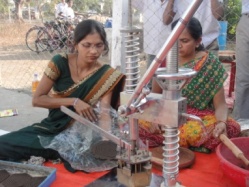
Two enterprises in Antergaon and Deulgaon villages of Seloo Block are producing Cow-dung based chemical free Incense Sticks and other products like Dhoop Batti, tooth powder, and mosquito coil.
Cow Urine Collection Unit
Cow urine is the basic component in the preparation of herbal pesticides, manure, plant nutrients, and seed germination booster. To meet the demand of farmers, 12 Cow Urine collection centers were established in Arvi, Faridpur, Tawi, Shiwanphal, Khursapar, Bhawanpur, Girad, and Pimpal Gaon villages of Samudrapur block.
Forest-Based Enterprises
Herbal Products
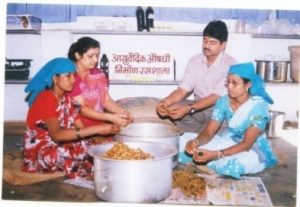
These enterprises are manufacturing 20 varieties of products from forest produce like Aloe Vera, Amla, Bel, Ber, Mango, Tamarind, Tulsi, and Neem. From plucking to processing of forest produce,these enterprises are providing livelihoods to tribal households.
Herbal Medicines
The herbal product units are established in Jamni and Antargaon villages. The unit manufactures thirteen herbal products, including health products, especially for lactating mothers, white discharge, general weakness, anaemia, cough, cold, diabetes, pain, sore feet, cuts, and burns. They also make therapeutic massage oils, hair conditioners, and skincare products.
Wild Palm Broom

Wild palm grows abundantly in some parts of this region. Because of the high cost of grass brooms, the villagers generally use locally made wild palm broom.
To improve the quality and life of palm broom, an electric shredder machine is introduced to the broom artisans. Keeping in view the market demand, MSS trained the broom artisans to make new varieties of brooms like Temple broom (for cleaning household temple), Laxmi broom (for Laxmi Poojan), Truck broom (for cleaning the truck driver’s cabin), Decorative Broom (with a decorative handle made from Palm leaf), and Colored Wooden Handle broom etc.
Wooden Toys from Waste Wood

The Doodh Koda (Tomentosa Dinctoria) is a softwood tree that grows wildly in the forest of the Vidarbha region. This wood is generally used as fuel but in Andhra Pradesh, it is used for making toys and utility items.
MSS invited Artisans from Andhra Pradesh and trained a team of women in the art of using Dudh Koda wood for manufacturing educational toys, buttons, key chains, incense stick stands, birds and ornaments. These products are coloured with natural Lacquer, making them Eco –Friendly and harmless for small children and toddlers.
Lantana Furniture
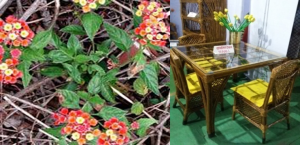
Lantana Camara is a wild forest weed that hinders the growth of other forest plants. To control its spread, the forest department, at most places in the region, burn it. Instead of burning it, MSS Unit is utilizing Lantana for making furniture as it is durable, insect-free, and is a cheaper substitute for wood and bamboo furniture.
Wild Sponge Gourd Scrubber
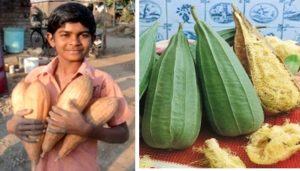
The rural women and children collect wild sponge gourd from surrounding wasteland and forest and supply them to the unit. The unit makes natural Loofa scrubber for bathing and also a scrubber for cleaning vessels.
Utility Product Enterprise
_______________________________________________
Soap Unit
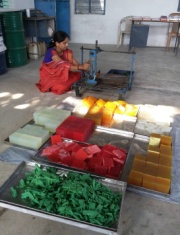
Utility Products
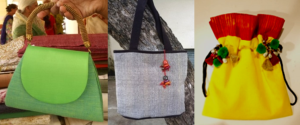
The women trained in tailoring & Handicraft run the utility product enterprise. The enterprise manufactures school bags, carry bags, money purses, Roti pads, file covers, etc.
Recycled Paper Products
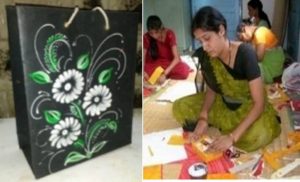
Fly Ash Bricks
To minimize the environmental degradation caused by using fertile soil and checking carbon emission in the atmosphere for manufacturing bricks, MSS took to using Fly Ash to manufacture bricks. (Fly ash is a very fine glassy p
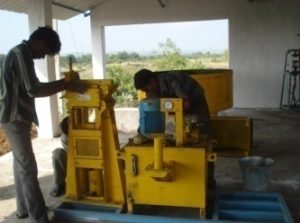
owdery material, predominantly silica, generated by the combustion of fine ground coal in thermal power plants).
The Fly Ash brick is manufactured by mixing industrial wastes like Fly Ash, stone dust, Gypsum, and Lime sludge and making bricks by using a specially designed hydraulic press. The Fly Ash Brick enterprise is established in Antargaon village.
Prefabricated Building components
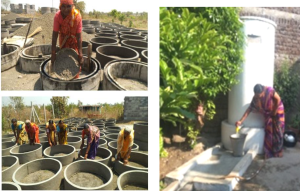
.In rural areas, the drinking water is supplied only on two days per week, that too only for half an hour. Due to lack of storage facilities, the rural households are unable to store water in sufficient quantity. To meet this demand the unit fabricates 1000 lt. capacity water storage tanks, each tank costing Rs.12,000. Compared to the plastic tank the cement tank, is more durable and keeps the water cool.

